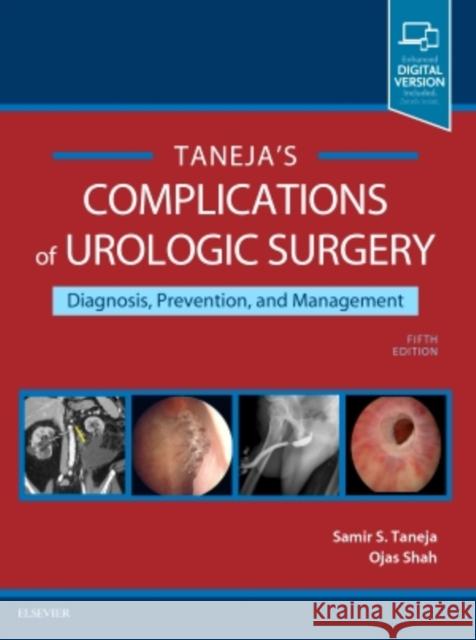Complications of Urologic Surgery: Prevention and Management » książka



Complications of Urologic Surgery: Prevention and Management
ISBN-13: 9780323392426 / Angielski / Twarda / 2017 / 768 str.
Complications of Urologic Surgery: Prevention and Management
ISBN-13: 9780323392426 / Angielski / Twarda / 2017 / 768 str.
(netto: 979,50 VAT: 5%)
Najniższa cena z 30 dni: 1015,91
ok. 30 dni roboczych.
Darmowa dostawa!
"This is a valuable book for all providers who care for urological patients. Every provider who has a book on how to perform urological surgery should also have an accompanying book, such as this one, that helps to guide the preoperative and postoperative management of patients." Reviewed by Paul H. Chung, MD (Thomas Jefferson University) Doody's Score: 91, 4 Stars!
Section I: Non-Urologic Complications of Urologic Surgery
1. Impact of Host Factors and Co-Morbid Conditions
2. Pulmonary Complications of Urologic Surgery
3. Cardiac Complications of Urologic Surgery
4. Hematologic complications
5. Metabolic Complications of Urologic Surgery
6. Anesthetic Complications
Section II: Complications of Medical Therapies
7. Pharmalogical Complications
8. Complications of Intravesical Therapy
9. Complications of Hormonal Treatment for Prostate Cancer
10. Toxicities of Chemotherapy for Genitourinary Malignancies
11. Complications of Radiation Therapy for Urologic Cancer
Section III: Complications of Minimally Invasive Urologic Procedures
12. Complications of Therapeutic Radiologic Procedures
13. Complications of ESWL
14. Complications of Renal Tissue Ablation
15. Complications of Interstital Seed Implantation
16. Complications of Cryosurgical Ablation of Prostate
17. Complications of Minimally Invasive Procedures for Benign Prostatic Hyperplasia
18. Complications of Lasers in Urologic Surgery
Section IV: Common Surgical Considerations
19. Assessing Quality of Care in Urologic Surgery
20. Complications of the Incision and Patient Positioning
21. Management of Vascular Complications
22. Management of Bowel Complications
23. Management of Urinary Fistulas
Section V: Complications of Endourologic Procedures
24. Complications of Transurethral Resection of the Prostate
25. Complications of Transurethral Resection of Bladder Tumors
26. Complications of Ureteropyeloscopy
27. Complications of Percutaneous Renal Surgery
Section VI: Complications of Laparoscopic Procecures
28. Special Considerations in Laparoscopy
29. Complications of Laparoscopic Renal Surgery
30. Complications Following Laparoscopic Robot-Assisted Radical Prostatectomy
31. Complications of Minimally Invasive Reconstruction of the Upper Urinary Tract
32. Complications of Robotic Surgery
Section VII: Complications of Retroperitoneal Surgery
33. Complications of Nephrectomy
34. Complications of Partial Nephrectomy
35. Complications of Renovascular Surgery
36. Complications of Renal Stone Surgery
37. Complications of Renal Transplantion
38. Complications of Ureteral Surgery
39. Complications of Adrenalectomy
40. Complications of Lymphadenectomy
Section VIII: Complications of Pelvic Surgery
41. Complications of Radical Cystectomy
42. Complications of Simple Prostatectomy
43. Complications of Radical Perineal Prostatectomy
44. Complications of Radical Retropubic Prostatectomy
45. Longterm Outcomes of Radical Prostatectomy
Section IX: Complications of Reconstructive Surgery
46. Complications of Urinary Conduit Diversion
47. Complications of Continent Cutaneous Diversion
48. Complications of Orthotopic Neobladder
49. Complications of Bladder Augmentation
50. Complications of Female Incontinence Surgery
51. Complications of Male Incontinence Surgery
52. Complications of Urethral Reconstruction
53. Complications of Surgery for Erectile Dysfunction and Peyronie's Disease
54. Complications of Surgery of the Scrotum, Testis, and Vas
Section X: Complicatiosn of Pediatric Urologic Surgery
55. Special Considerations in the Pediatric Patient
56. Complications of Pediatric Laparoscopy
57. Complications of Surgery for Posterior Urethral Valves
58. Complications of Ureteral Reimplantation, Anti-reflux Surgery and Megaureter Repair
59. Complications of Exstrophy and Epispadias Repair
60. Complications of Hypospadias Repair
61. Complications of Surgery for Disorders of Sex Development
Dr Taneja's clinical research focuses on the use of imaging to detect and treat prostate cancer. I pioneered the use of MRI to diagnose and pinpoint prostate cancer, and in MRI-guided focal ablative therapies that aim to destroy only the cancerous portion of the prostate. With the ability to precisely locate the cancer, patients no longer need to have the entire gland removed. Through ongoing improvements in imaging and constant integration of new technologies, we continue to evolve this approach to minimize the trauma of prostate cancer surgery.
He has authored more than 200 articles, 30 book chapters, and 6 textbooks and monographs on urologic cancer and surgery.
George F. Cahill Professor of Urology at Columbia University College of Physicians and Surgeons. He also serves as the Director of the Division of Endourology and Stone Disease at Columbia University Medical Center.
Dr. Shah is a nationally and internationally recognized expert in the medical and surgical management of patients with urinary stone disease. He recently served as a member of the American Urological Association's Surgical Management of Stones Guidelines Committee. He was also recently appointed to the American Board of Urology's Examination Committee. He is an active member of the Endourological Society, EDGE (Endourology Disease Group for Excellence) Research Consortium, and ROCK (Research on Calculous Kinetics) Society.
Dr. Shah is an Assistant Editor for the Journal of Urology, the most highly cited and amongst the most respected international journals in the field. He is also co-editor of the 5th Edition of Taneja's Complications of Urologic Surgery which was released in 2018.
Dr. Shah serves as the Director of the Endourology Fellowship at Columbia University Medical Center. He additionally has a strong focus on medical student and resident education, and served as the urology residency program director at NYU School of Medicine prior to joining Columbia.
1997-2026 DolnySlask.com Agencja Internetowa
KrainaKsiazek.PL - Księgarnia Internetowa









